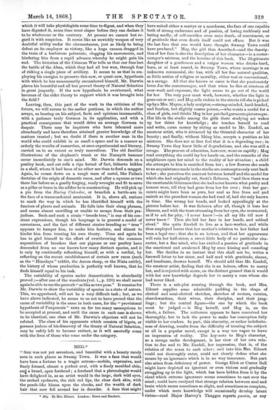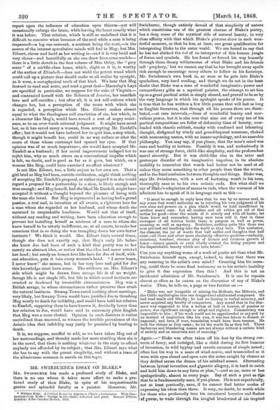MEG.*
" SHE was not yet seventeen, and beautiful with a beauty rarely seen in such places as Swamp Town. It was a face that would have been a fortune to a tragic actress—mobile, expressive, and finely formed, almost a perfect oval, with a finely moulded chin, an a broad, open forehead ; a forehead that a phrenologist would have delighted in, as an artist would in the large, dark wild eyes, the arched eyebrows, the rich red lips, the clear dark skin, with the peach-like bloom upon the cheeks, and the wealth of dark hair that now fell around her in disorder. A face that might * Meg. By Mrs. Mari. London: Hurst and Blackett. have suited either a martyr or a murderess, the face of one capable both of strong endurance and of passion, of loving recklessly and hating madly, of self-sacrifice even unto death, of resentment, or of gratitude that even death itself could not efface. But it was the last face that one would have thought Swamp Town could have produced." Meg, the girl thus described—and the descrip- tion of her face is also the description of her character—is a °ester- monger's mistress, and the heroine of this book. The illegitimate daughter of a gentleman and a vulgar woman who drinks hard, born, or at least reared, in Swamp Town, where marriage is an unknown ceremonial, she has, with all her fine natural qualities, as little notion of religion or morality, either real or conventional, as a savage. All that she knows or cares is that she passionately loves Joe the costermonger, and that when he dies at nineteen of over-work and exposure, the light seems to go out of the world for her. The very poor must work, however, whether the light is gone out or not ; and Meg sells violets in the streets till she is picked up by a Mrs. Mayne, a lady sculptor,—strong-minded, hard-headed, and fearless, but slightly coarse person,—who wants a model for a class of girls, and thinks Meg in her patched garments picturesque. Her life in the studio among the girls there studying art wakes up her thirst for knowledge ; she teaches herself to read and write, earns money by sitting as model to Mr. Ensdell, an amateur artist, who is attracted by the Oriental character of her beauty ; and finally, without liking him, accepts a position as his mistress. She does not at first feel that it is a degrading one ; in Swamp Town they knew little of degradations, and she was still a savage. The process of education, however, went on rapidly ; Meg read everything she could lay her hands on, and the remarks of the neighbours open her mind to the reality of her situation ; a child she attempts to kiss is snatched from her ; a few flowers she sends to an acquaintance made in the studio are contemptuously sent back to her ; she perceives the contrast between herself and the model for which she had originally sat, Scott's Rebecca, "and then there was the unutterable bitterness that she had never known what purity and honour were, till they had gone from her for ever ; that her gar- ments might have been as pure, her soul as free from soil and smirch as the proudest woman she had read of, had she only known in time. She wrung her hands, and looked appealingly at the picture before her. It was Rebecca after all, though it bore her likeness, and with the tears streaming from her eyes, she murmured, as if to ask for pity, I never knew !—in all my life till now I never knew P Then she hid her face in her hands, and sobbed aloud." She quits Ensdell to live as a lace-worker, and while thus employed learns that her mother's relation to her father had been a legal one ; that she is an heiress, and that her appearance will ruin her half-sister, a sweet little body of no particular cha- racter, but a fine mind, who has excited a passion of gratitude in the emotional and awakened Meg by once kissing and consoling her. She decides in an instant that this shall not be, writes a farewell letter to her sister, and half mad with gratitude, shame, and loneliness, drowns herself. We should add that Mr. Ensdell, the amateur artist, finding that she is an heiress, offers to marry her, and is rejected with scorn, on the distinct ground that it would with her new knowledge degrade her to marry a man whom she had never liked.
There is a sub-plot running through the book, and Mrs. Eiloart supplies some admirable padding in the shape of clerical and semi-clerical sketches, sketches of rectors, curates, churchwardens, their wives, their disciples, and their jang- hugs ; but the central figure—the one by which the book must be judged — is Meg herself, and Meg is, on the whole, a failure. The authoress appears to have conceived her thoroughly, but to lack the power to make her conception fully visible to her readers. In part, this obscurity, or rather indefinite- ness of drawing, results from the difficulty of treating the subject at all in a popular novel, except in a way too vague to leave an impression of reality. The key-note to Meg's character, as a savage under development, is her view of her own rela- tion to Joe and to Mr. Ensdell, her impression, that is, of the relation of the sexes to each other ; and into this Mrs. Eiloart could not thoroughly enter, could not clearly define what she means by an ignorance which is in no way innocence. But part also arises from deficiency of power. George Eliot or Caner Bell might have depicted an ignorant or even vicious soul gradually struggling up to the light, which has been hidden from it by the cloud which extreme ignorance seems sometimes to cast over the
mind ; could have analyzed that strange relation between soul and brain which seems sometimes so slight, and sometimes so complete, under which mere knowledge will occasionally develop latent virtue—read Major Harvey's Thuggee reports passim, or any report upon the influence of education upon thieves—yet will occasionally enlarge the brain, while leaving the heart exactly what it was before. That relation, which is still so undefined that it is difficult to conceive what becomes of the soul while a man is being trepanned—a log one moment, a sentient being the next,—is the source of the interest speculative minds will feel in Meg; but Mrs. Eiloart, clever and lucid as her writing is—and it is very lucid and very clever—and beautifully as she can draw from some models— there is a little sketch in the first volume of Mrs. Orley, the "grey mare" of a middle-class home, which, slight as it is, is worthy of the author of Elizabeth—does not wield the potent wand which could call up a picture that should make us all realize by eyesight, as it were, a metaphysical truth of that kind. We hear that Meg learned to read and write, and read a great deal—Macaulay's Lays are specified in particular, we suppose for the sake of Virginia— and contrasted herself with the Rebecca of Ivanhoe, her unselfish love and self-sacrifice; but after all, it is not self-culture which changes her, but a perception of the scorn with which she is regarded, a perception which Mrs. Eiloart makes almost equal to what the theologians call conviction of sin, but which, in a character like Meg's, would have roused a sort of angry resist- ance, as to an over-harsh external judgment. It might have saved her, as it has saved many a woman, from accepting Mr. EnsdelPs offer ; but it would not have induced her to quit him, a step which, though it might benefit her, could in no way reduce or alter the scorn of those whose contempt had opened her eyes. If that opinion was of so much importance, she would have accepted Mr. Ensdell as a husband ; if her moral improvement induced her to reject him, why so much stress on a conventional impulse which is felt, no doubt, and is good as far as it goes, but which, on a woman like Meg, could have exercised no effect whatever ?
Is not Mrs. Eiloart, too, a little unjust 0 her own sex. That a girl bred as Meg had been, outside civilization, might think nothing of accepting Mr. Ensdell's proposal, or rather regard it as she would regard a proposal for a partnership in a shop, is likely enough and true enough; and Meg herself, had she liked Mr Ensdell, might have accepted it without a thought beyond the pleasure of living with the in= she loved. But Meg is represented as having bad a grand passion, a real and, in intention at all events, a righteous love for a man whom she regarded as her husband, and whose death she mourned in unspeakable loneliness. Would not that of itself, without any reading and writing, have been education enough to prevent her installing herself as mistress of a man to whom she knew herself to be utterly indifferent, or, at all events, to make her conscious that in so doing she was trampling down her own better instincts? We think it would. Mrs. Eiloart hints several times, though she does not exactly say, that Meg's early life before she knew Joe had been of such a kind that purity was to her merely an abstract idea, or rather that the idea had never entered her head ; but surely an honest love like hers for Joe of itself, with- out education, puts it into every woman's head. "I never knew, I never knew!" she moans, but in her very love and grief for Joe this knowledge must have come. The evidence on Mrs. Eiloart's side which might be drawn from savage life is of no weight. Savage life is not simple life, but life in which sound instincts are crushed or deadened by irresistible circumstances. Meg was a British savage, in whom circumstances rather preserve than crush the natural instincts. Swamp Town cared nothing about marriage, very likely, but Swamp Town would have justified Joe in thrashing Meg nearly to death for infidelity, and would have held her relation to Ensdell, supposing them to have known it, decidedly lower than her relation to Joe, would have said in extremely plain English that Meg was a mere chattel. Opinion in such districts is rather uncivilized than unsound, as witness the terrible prevalence of the Asiatic idea that infidelity may justly be punished by beating to death.
It is, we suppose, needful to add, as we have taken Meg out of her surroundings, and thereby made her more startling than she is in the novel, that there is nothing whatever in the story to offend anybody not offended by its subject ; that Mrs. Eiloart says what she has to say with the purest simplicity, and without a trace of the allusiveness common in novels on this topic.































 Previous page
Previous page